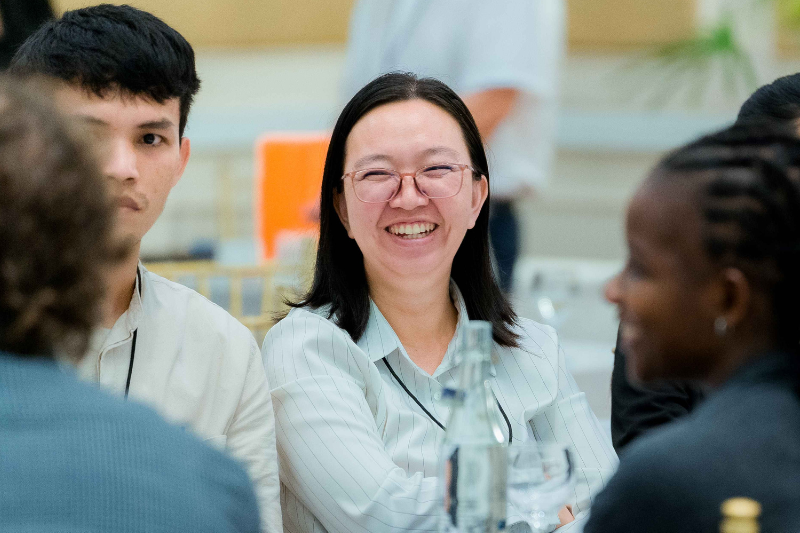
Upon returning to Cambodia in 2016 after four years abroad, Navin Sreng found herself at an unexpected crossroads in her scientific career. She had a newly minted Ph.D. in biology in hand from France’s prestigious Paul Sabatier University, where she attended on full scholarship, and had her sights set on a faculty position back home.
“The scholarship had a requirement that when I finish my studies, I come back to help my home country,” says Sreng, who grew up in Phnom Penh to a middle-class family. “And when I was in France, I was close to a Cambodian lecturer who advised me that I should work for a university.”
But, the only employment the university could offer at the time was a part-time teaching position — in fact, the exact same one she had before leaving for France. Despite being overqualified, Sreng took the job, assuming the school would find a more suitable position for her soon enough. She waited for months, hoping the situation would change.
When the promotion never came, Sreng decided to leave academic research for the private sector. She took a chance by applying to the Institut Pasteur du Cambodge, part of the famed Pasteur Institute’s international network of health centers. Institut Pasteur du Cambodge operates under the auspices of both the Cambodian Ministry of Health and the Institut Pasteur. Her prior work on type 2 diabetes didn’t quite overlap with the institute’s focus on infectious diseases, but after a brief internship in bacteriology, she secured a job as a staff scientist in 2017.
Today, Sreng serves as the head of the Laboratory of Environment and Food Safety (LEFS) at the Institut Pasteur du Cambodge. The mission of LEFS is to assist food operators across the food system to detect, control and prevent foodborne illnesses and to provide quality and healthy foods. The laboratory performs a wide range of analyses, including food microbiology testing, microbiology and chemical testing for different types of water, air contamination testing, and surface contact testing.
“My task is to manage the laboratory and push us in the right direction to reach a particular vision,” she says. “Last year, we became accredited by the International Accreditation Service as proof of the technical competence and the commitment to continuous improvement of quality service of the laboratory and its staff.”
Sreng is also involved with LEFS’ research projects, including one funded by the FSIL. The lab is one of 20 such labs in a network under Feed the Future, the U.S. government’s global hunger and food security initiative led by USAID. The FSIL project, titled “Reducing Foodborne Pathogen Contamination of Vegetables in Cambodia: Innovative Research, Targeted Interventions, and Impactful, Cambodian-led Engagement,” is targeting food safety gaps in the production, distribution and sale of vegetables in Cambodia.
“The purpose of the project is to investigate the contamination rate of bacteria — especially E. coli and Salmonella — in fresh vegetables like lettuce, tomatoes and cucumbers,” Sreng says. “We want to see where exactly the contamination takes place, from farm to market.”
In recent years, both the Cambodian government and international development organizations have taken steps to reduce malnutrition by implementing policies and programs, including those designed to increase local production and consumption of vegetables. However, produce must be protected from cross-contamination with pathogens during all stages — production, processing, transport, sale and meal preparation — to lower the risk of foodborne illness.
The project brings together an interdisciplinary team of researchers from both the United States and Cambodia. Sreng collaborates with lead researchers Jessie Vipham of Kansas State University and Paul Ebner of Purdue University, as well as colleagues based in her home country at the Center of Excellence on Sustainable Agricultural Intensification and Nutrition, Royal University of Agriculture, Institute of Technology Cambodia, and the World Vegetable Center.
The researchers collected samples of different vegetables from farms, distribution centers, wholesale markets and retail markets in two provinces: Battambang and Siem Reap. Sreng and her colleagues at LEFS then analyzed the Siem Reap samples to identify the critical control points for foodborne illness. Next, they plan to evaluate new and existing interventions to reduce microbial contamination at these critical control points in the vegetable value chain.
Sreng hopes that the FSIL project will accelerate the adoption of food safety in Cambodia and promote greater awareness of food safety risks among stakeholders such as farmers, produce collectors, market vendors and consumers. And even though she ended up in the private sector and not academia, Sreng wholeheartedly believes she landed in the right place.
“In the food safety training that I do, I can share all the knowledge that I have with people and alert them to the problem of foodborne illness,” says Sreng. “I think this could help make a difference — maybe not to the whole country, but at least to the people who I meet.”
Meeri Kim is a freelance writer with the Feed the Future Innovation Lab for Food Safety. The Innovation Lab is one of a network of 20 such labs led by U.S. universities under Feed the Future, the U.S. government’s global hunger and food security initiative led by USAID.

